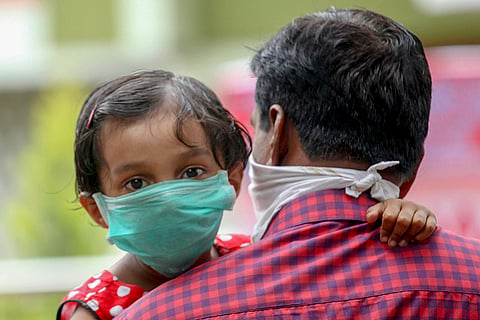

A section of the medical community in Bengaluru as in other parts of the country are asking for safe and efficient vaccines for children to be made available ahead of the third wave of the COVID-19 pandemic. This, as they are expecting children to be the most vulnerable section of the population in the third wave. It should be noted that schools, especially for junior classes, have largely remained closed since the onset of the pandemic in March 2020. Currently in India, ZyCoV-D and Covaxin (in use for adults) is under trial for children above the age of 12. In certain nations like in the US, Canada, and Singapore, vaccines like Pfizer have already been approved for use for children above the age of 12.
“The third wave of the virus will affect children of all ages, but has the potential to cause significant concern in infants and adolescent age groups respectively,” Dr Srikanta JT, Consultant – Paediatric Pulmonology, Aster CMI Hospital, said. Similarly, Dr Mayuri Yeole, Associate Consultant, Paediatrics, Apollo Hospitals, said vaccination is important not only for immunity but overall wellbeing of children too. “Vaccination will not only help boost their immunity, but also make attending schools and outings stress-free. It will help them live their childhood, and not be confined within four walls,” she said. “Like the flu vaccine, it seems essential to have a COVID-19 vaccine for children too – while it may not prevent children from contracting the novel coronavirus, it will help reduce the morbidity and mortality which we are anticipating with the third wave,” she added.
But some experts are of the belief that the government should currently focus on vaccinating the 18 and above population at first in wake of large-scale vaccine shortage, as they see children as less likely to have severe disease. Dr Anand Lakhsman, CEO of Address Health (a company focussed on paediatric healthcare and ties up with schools) said there is no evidence to suggest that the third phase will affect children more.
While consolidated pan-India data on children’s mortality due to COVID-19 is not available, according to Karnataka government data, 105 persons of the age group 1-19 (including 18+) years have died due to COVID-19. The case fatality rate is less than 0.1% in the said age group till April 18, as per the latest Karnataka War Room report. In Mumbai, according to official records till May 19, the number of deaths between 0-19 years of age was 52, compared to the total COVID-19 death toll of 14,409. In the US, till March 27, 238 children had died due to COVID-19 accounting for 0.04% of all COVID-19 deaths in the country. “Usually, the children who pass away have had chronic illnesses and were already vulnerable. Across the globe, the rate of death and even hospitalisation among children is significantly lower,” he said.
He argued that the presumption that the children are currently safe from infections due to schools being shut may not be accurate at all. “We need serological evidence. So far, Delhi is the only state to do a serosurvey (in August 2020) including children above 12. It found that the infections in children were slightly higher but statistically insignificant compared to adults.” It is to be noted that serosurvey detects presence of antibodies and not the virus. “So, it means that children were exposed to the virus at a similar degree but they were highly asymptomatic,” Dr Anand explained.
Dr Anand said that the prevalent variants of the virus in the second wave are more infectious and less deadly which is the natural progression of any virus. He pointed out that it is natural that the number of children getting infected and diagnosed has increased. However, that has not led to significant increase in hospitalisation.
Instead of prioritising children’s vaccination over population over 18, Dr Anand suggested that the government should focus on pressing areas of malnutrition, immunisation against basic diseases in children. “We cannot compare ourselves with the West where many places even have surplus vaccines while our children are dying due to lack of access to basic nutrition and immunisation,” Dr Anand argued.
Similarly, Dr Asha Benakappa, professor and a veteran paediatrician, said, At this point, we are having too much unnecessary panic [regarding children] when we have vaccinated only 3% of the population fully. We should focus on frontline workers, the over 60 age group, and then people with comorbidities should be prioritised.” She added, “There is no urgency to vaccinate children as they are less prone to severe disease. One reason is that their immune system is under development. And they are given live vaccines for other diseases like MMR, chicken pox and H1N1 and others. So, unlike older people, their immune systems are much more active.”
Instead, she said that the idea of ‘cocooning’ should be followed. “If we don’t vaccinate the parents first, there will be difficulty in managing the children. So, if we can protect the parents, to a large extent, we can naturally prevent infection among children,” she explained.
Another community physician, Dr Edmond Fernandes, said, “The government must consider vaccinating citizens in the age group of 18-70 on priority, and also complete the vaccination in metro and tier II cities on priority before November. The focus on children can wait as trails progress, but the focus must now be on geographies beyond metros and tier-II cities to avoid further devastation by the pandemic.”